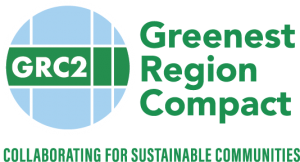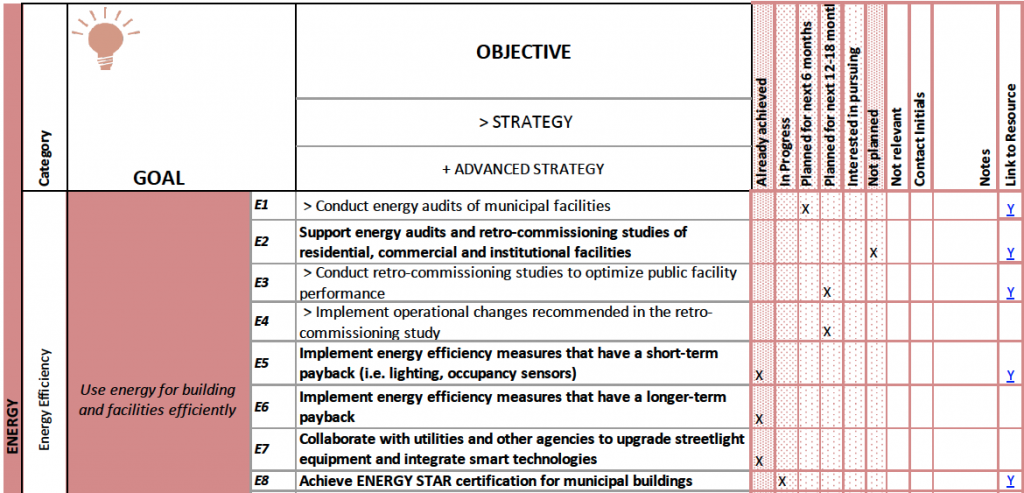 The Greenest Region Compact (GRC) leverages the strength of municipal government to build vibrant, sustainable communities across the Chicago region.
The Greenest Region Compact (GRC) leverages the strength of municipal government to build vibrant, sustainable communities across the Chicago region.
The foundation of the GRC is 49 high-level goals that have been reached by consensus; not only are the goals aligned with important local, regional, national and global goals, but they are also broadly supported by municipal members of the Metropolitan Mayors Caucus and allied organizations. These consensus goals guide municipal action, support mayors in their role as environmental leaders, and foster collaboration that has positive impacts on sustainability in the region.
Greenest Region Compact Communities
Municipalities adopt the GRC by formal resolution and agree to work to achieve GRC goals in their community and in collaboration with other municipalities across the region.
To date, 165 communities of all sizes and strengths have adopted the GRC to improve the quality of life for more than 6.7 million residents, which makes the GRC the largest regional sustainability collaborative for municipalities in the country. See the full list of GRC Communities.
In addition to municipalities, Cook, DuPage, Kane, Will, Lake, and McHenry Counties have adopted the GRC.
All Chicago-region Councils of Government have also adopted the GRC:
Barrington Area Council of Governments
DuPage Mayors and Managers Conference
Lake County Municipal League
McHenry County Council of Governments
Metro West Council of Governments
Northwest Municipal Conference
South Suburban Mayors & Managers
Southwest Conference of Mayors
West Central Municipal Conference
Will County Governmental League
Adopting the Greenest Region Compact
All Metropolitan Mayors Caucus member communities are invited to support the GRC by passing a municipal resolution. The GRC’s 49 high-level goals are tailored for municipalities and fall into ten sustainability categories: climate, economic development, energy, land, leadership, mobility, municipal operations, sustainable communities, water, and waste & recycling. Municipalities that adopt the GRC are making a commitment to generally support its consensus goals. Specific actions are prioritized and monitored by communities to best suit their own objectives and abilities.

The Greenest Region Compact has 10 sustainability categories.
Once your village/county board or city council passes this model municipal resolution supporting the goals of the GRC, and you report your community’s adoption of the GRC to Edith Makra, Director of Environmental Initiatives, you become a GRC Community. You will then be given access to GRC promotional material and invited to join in collaborative projects that will help achieve GRC goals for your community and the region. At this time, there is no reporting requirement for GRC Communities and there is no cost to Metropolitan Mayors Caucus members.
GRC Framework: A Foundation for Sustainability
The GRC Framework is the companion document that provides objectives, strategies, and tools to help communities address goals of the GRC. The Framework is flexible—municipalities of all sizes and resource levels can use the Framework to undertake appropriate and impactful sustainability actions. The Framework incorporates sustainability programs already accessible and popular with local governments. Use the GRC Framework as a self-assessment checklist to inventory your municipal accomplishments. The results can inform residents, staff and guide future planning.

Municipalities can use the GRC Framework to check off what sustainable actions they have taken and what is in progress.
For communities with their own sustainability plan, the GRC can be used as a tool to support and enhance sustainability efforts in your community. For communities with no formal sustainability plan, the Framework offers a menu of options in each of the 10 GRC sustainability categories that may be used to construct a local, tailored sustainability plan. The Framework is designed to help communities assess their current initiatives, select suitable goals and actions, and tailor objectives and strategies to advance their own sustainability agendas. Use this guide to the GRC Framework and the GRC Framework Tool in Excel to construct your own sustainability plan. Download a printer-friendly version of the GRC Framework here.
See these examples of sustainability reports and plans based on the GRC:
Aurora Sustainability Plan
Brookfield Sustainability Plan
Countryside Sustainability Plan
Deer Park Sustainability Report
Downers Grove GRC Report
Geneva sustainability assessment
Grayslake Sustainability Plan
Hoffman Estates Sustainability Plan
Highland Park Sustainability Plan Update
LaGrange Green Initiatives
Rolling Meadows Sustainability Plan
Wilmette Sustainable Communities Strategic Plan
Waukegan Sustainability Plan
Collaboration through the Greenest Region Compact
Collaboration through the Greenest Region Compact accelerates community progress towards sustainability. GRC communities regularly demonstrate a commitment to sustainability by taking action together and working toward common goals. For example, a dozen GRC communities worked collaboratively to address the GRC goal “Enact policies that support clean energy”, positioning Illinois as the leading state for SolSmart- designated communities. The SolSmart program offers a pathway for municipalities to streamline codes, policies, and practices to encourage safe and efficient solar development. GRC communities collaborated to achieve SolSmart program benchmarks as they aligned with strategies identified in the GRC Framework. This foundation allowed the Caucus to lead more Illinois communities to earn SolSmart than any other state.
The Caucus also leverages clean energy demands of GRC Communities to collaboratively purchase community solar through the Community Solar Clearinghouse Solutions program (CS2).
In July of 2021, the Caucus released its regional climate plan that it co-wrote with the National Oceanic and Atmospheric Administration (NOAA). Leveraging the might of GRC Communities, our GRC collaborative was selected as one of only four pilot regions chosen by the Global Covenant of Mayors for Climate & Energy (GCoM) to demonstrate the power of regional climate planning in the U.S.
Supporting communities in working towards these goals is the primary aim of the Caucus’ Environmental Initiatives. The Greenest Region Corps (GRCorps) was created to provide GRC communities and partners who serve GRC communities with sustainability talent to develop plans and tackle sustainability projects. About a dozen GRCorps members served GRC communities each year from 2018-2021, until the program was put on hold in 2022, due to a lack of funding.
Grants and assistance, when available, are targeted to support GRC goals and GRC communities. The Caucus’ Environment Committee is instrumental in its success. Collaborators and new committee members are welcome to join us in working toward a greener region.
GRC Documents
- Greenest Region Compact
- GRC Model Municipal Resolution (Word)
- GRC Framework Tool (PDF)
- GRC Framework Tool (Excel)
GRC Background
The GRC, launched in March of 2016, is a thoughtful update to the original pledge that was adopted by nearly 100 communities in 2007. This update is sometimes referred to as “GRC2”. The GRC also retains successful elements of the Caucus’ former Clean Air Counts program (2009), a successful regional effort to reduce air pollution.
Comprehensive research and planning resulted in the updated GRC pledge and the companion GRC Framework. The 49 consensus sustainability goals included in the Compact are derived from an extensive study of municipal, regional, national and global priorities and existing sustainability programs and efforts already underway. Thirty community sustainability plans already being used in the region were analyzed to help create the GRC. Further, it draws goals from nine regional or national sustainability plans. See the full list of plans here. The review of these sustainability plans captures the collective wisdom and efforts of the residents, leaders, and sustainability professionals who created these plans. It also assures that the GRC is in alignment with shared regional, national and global objectives. View a graph representing this analysis here.
Priority GRC areas are informed by the frequency of both existing goals in published sustainability plans and past environmental achievements. An extensive inventory of 95 different environmental achievements by all communities supplemented information from sustainability plans to create consensus goals and a program framework that is firmly rooted in local action and solutions.
The Chicago region is quite green! Research done to build the GRC shows that 81% of all communities are making substantial efforts toward sustainability, with 71% of communities responsible for the lion’s share of sustainable actions achieved in the region. As a result, the GRC is targeted to help the majority of communities who are making efforts towards sustainability by highlighting sensible actions that are achievable by communities of all sizes and strengths.
For example, the GRC goal of “Use energy for buildings and facilities efficiently” derives from such a goal in nearly all of the sustainability plans studied. Resources are available to help communities use building energy efficiently, and the most recent information available shows that about half of all communities have already retrofitted public facilities for energy efficiency. Further, CMAP’s regional greenhouse gas inventory shows building energy to be the greatest source of carbon emissions, making public-sector energy efficiency a regional priority that can be addressed by most local governments.
While communities may choose their own priority areas, the study showed the greatest interest in land stewardship, sustainable communities, water, mobility, and energy issues. To learn more about the methodology and results, read the full report, Greenest Region Compact, Opportunities + Impact.
Recognition
The development of the Greenest Region Compact initiative was generously supported by the Searle Funds at The Chicago Community Trust.
The work of the Greenest Region Compact has been honored with these awards:
- American Public Works Association – Exceptional Performance Award, Sustainability – 2017
- Chicago Wilderness – Force of Nature Award – 2017
- SolSmart Innovation Award – International City/County Management Association – 2019
- Interstate Renewable Energy Council – 3i Award State/Local Achievement of the Year – 2019
- Friends of the Chicago River Silver Ribbon Award – 2020
Media Coverage
The Greenest Region Compact has been mentioned in several news stories:
- A ‘laboratory of democracies’ approach: Rolling Meadows thinking local in fighting climate change – Daily Herald, Dec. 7, 2023
- Brookfield begins making sustainability a priority with new plans – Riverside-Brookfield Landmark, Nov. 7, 2023
- Elgin adds eight more parks, city-owned properties to its list of ‘pesticide-free’ zones – Elgin Courier-News, July 12, 2022
- Des Plaines council pledges to work on environmental sustainability – Daily Herald, Oct. 19, 2021
- Greener Glenview Launches In Partnership With Go Green Illinois – Patch, Oct. 20, 2021
- League honors Jason Sullivan with its inaugural Rising Star Civic Award – Daily Herald, Dec. 7, 2023
